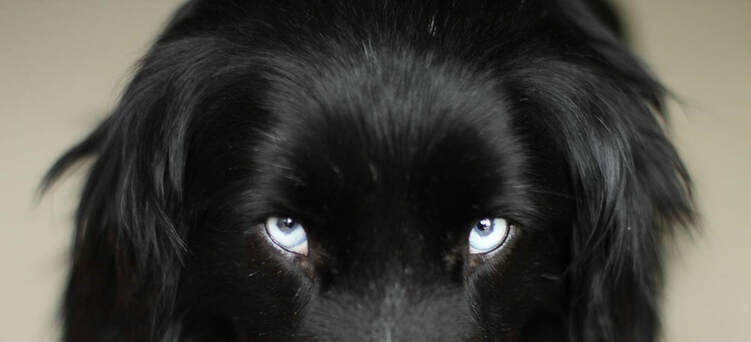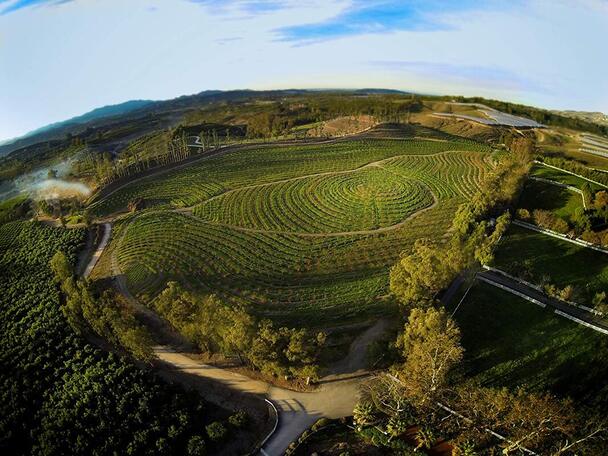THE BIGGEST LITTLE FARM
****
Director: John Chester
Screenwriters: John Chester and Mark Monroe
Principal cast:
John Chester
Molly Chester
Alan York
Todd the dog
Emma the pig
Mr. Greasy the rooster
Country: USA
Classification: PG
Runtime: 91 mins.
Australian release date: 16 January 2020
Previewed at: Palace Central, Sydney, on 9 December 2019.
As the world knows, Australia has borne the catastrophic results of numerous bushfires this summer and the loss of life, both human and animal, has been tragic, leaving the country enveloped in a cloud of smoke and depression. As happens in these tragic circumstances, however, mankind’s natural instinct is to rise up, phoenix-like, from the ashes and try to reinvigorate the scorched earth. It takes time and perseverance but it can be done. Although under different circumstances, John Chester’s documentary The Biggest Little Farm, depicting his family’s battle to nurse Mother Nature back to health, is a fine example of this possibility. In a spooky bit of synchronicity, the film begins with the Chesters battling the 2018 bushfires in southern California, but that’s not the real story on display here.
John and Molly Chester were L.A. city-dwellers until they received an eviction notice because their beloved rescue dog, Todd, would bark incessantly when they were away at work. The couple decided to move to the country, where Todd could bark to his heart’s content, so they relocated to 200 acres of worn-out land in Ventura County, armed only with the naïve desire to create an Eden-ish haven on Apricot Lane Farms. Wishing to farm biodynamically and recognising that they would need help, they engaged a seemingly eccentric consultant, Alan York. On his advice, they planted over 10,000 orchard trees and hundreds of different crops on ground that had been ravaged by drought and fires and depleted of the nutrients needed for their sustainability. York taught them how to enrich the soil though, and over a period of eight years they valiantly pursued their dream. There were the inevitable highs and lows as they not only had to battle the elements but also coyotes, snails, birds, gophers and a host of other predators, and they quickly learnt that “intent alone is not a protector.” On the plus side, they established wonderful relationships with a bunch of much friendlier animals, including Emma the pig and Mr. Greasy the rooster, an ‘odd couple’ that formed an inseparable bond. Along with a brace of Maremma sheepdogs, a herd of cattle, a flock of sheep, a clutch of chickens, a paddling of ducks and a very happy Todd, the Chesters ultimately achieved their goal of living in harmony with nature. Watching the land’s transformation is a joy to behold.
The beautiful locations and wildlife have been stunningly captured by a number of camera operators but primarily John Chester himself, who also narrates and directs. He is a professional filmmaker and his talent shows in The Biggest Little Farm. The cinematography is superb and makes good use of quite a number of impressive drone shots. At times, this live footage is augmented by nicely illustrated animated sections, to good effect. All in all, this is a very accomplished depiction of life on the land, supported by a fine score from Emmy-winning composer Jeff Beal. Occasionally, you might find yourself wishing for a little more detail about how Molly and John got through the tough times, but that’s a relatively minor quibble. The film is particularly relevant to Australian viewers right now because it provides hope by showing that, in the face of extreme adversity, it is possible to regenerate and win the fight for survival. Do not miss this wonderful documentary, it is an uplifting experience and a much-needed tonic during these difficult times.
Screenwriters: John Chester and Mark Monroe
Principal cast:
John Chester
Molly Chester
Alan York
Todd the dog
Emma the pig
Mr. Greasy the rooster
Country: USA
Classification: PG
Runtime: 91 mins.
Australian release date: 16 January 2020
Previewed at: Palace Central, Sydney, on 9 December 2019.
As the world knows, Australia has borne the catastrophic results of numerous bushfires this summer and the loss of life, both human and animal, has been tragic, leaving the country enveloped in a cloud of smoke and depression. As happens in these tragic circumstances, however, mankind’s natural instinct is to rise up, phoenix-like, from the ashes and try to reinvigorate the scorched earth. It takes time and perseverance but it can be done. Although under different circumstances, John Chester’s documentary The Biggest Little Farm, depicting his family’s battle to nurse Mother Nature back to health, is a fine example of this possibility. In a spooky bit of synchronicity, the film begins with the Chesters battling the 2018 bushfires in southern California, but that’s not the real story on display here.
John and Molly Chester were L.A. city-dwellers until they received an eviction notice because their beloved rescue dog, Todd, would bark incessantly when they were away at work. The couple decided to move to the country, where Todd could bark to his heart’s content, so they relocated to 200 acres of worn-out land in Ventura County, armed only with the naïve desire to create an Eden-ish haven on Apricot Lane Farms. Wishing to farm biodynamically and recognising that they would need help, they engaged a seemingly eccentric consultant, Alan York. On his advice, they planted over 10,000 orchard trees and hundreds of different crops on ground that had been ravaged by drought and fires and depleted of the nutrients needed for their sustainability. York taught them how to enrich the soil though, and over a period of eight years they valiantly pursued their dream. There were the inevitable highs and lows as they not only had to battle the elements but also coyotes, snails, birds, gophers and a host of other predators, and they quickly learnt that “intent alone is not a protector.” On the plus side, they established wonderful relationships with a bunch of much friendlier animals, including Emma the pig and Mr. Greasy the rooster, an ‘odd couple’ that formed an inseparable bond. Along with a brace of Maremma sheepdogs, a herd of cattle, a flock of sheep, a clutch of chickens, a paddling of ducks and a very happy Todd, the Chesters ultimately achieved their goal of living in harmony with nature. Watching the land’s transformation is a joy to behold.
The beautiful locations and wildlife have been stunningly captured by a number of camera operators but primarily John Chester himself, who also narrates and directs. He is a professional filmmaker and his talent shows in The Biggest Little Farm. The cinematography is superb and makes good use of quite a number of impressive drone shots. At times, this live footage is augmented by nicely illustrated animated sections, to good effect. All in all, this is a very accomplished depiction of life on the land, supported by a fine score from Emmy-winning composer Jeff Beal. Occasionally, you might find yourself wishing for a little more detail about how Molly and John got through the tough times, but that’s a relatively minor quibble. The film is particularly relevant to Australian viewers right now because it provides hope by showing that, in the face of extreme adversity, it is possible to regenerate and win the fight for survival. Do not miss this wonderful documentary, it is an uplifting experience and a much-needed tonic during these difficult times.

